Did Global Warming stop in 1998, 1995, 2002, 2007, 2010?
Posted on 27 December 2010 by villabolo
A common claim, made by those who deny man-made global warming, is that the Earth has been cooling recently. 1998 was the first year claimed by 'skeptics' for "Global Cooling". Then 1995 followed by 2002. 'Skeptics' have also emphasized the year 2007-2008 and most recently the last half of 2010.
NASA and climate scientists throughout the world have said, however, that the years starting since 1998 have been the hottest in all recorded temperature history. Do these claims sound confusing and contradictory? Has the Earth been cooling, lately?
To find out whether there is actually a "cooling trend" it is important to consider all of these claims as a whole since they follow the same pattern. In making these claims, 'skeptics' take short periods of time, usually about 10 years or less, out of context ("Cherry picked.") from 30 years of evidence; the minimum needed to make a valid judgment.
'Skeptics' also take selected areas of the world where cold records for the recent past are being set while ignoring other areas where all time heat records are being set.
The temperature chart below is based on information acquired from NASA heat sensing satellites. It covers a 30 year period from January 1979 to November 2010. The red curve indicates the average temperature throughout the entire Earth.
The red line represents the average temperature. The top of the curves are warmer years caused by El Niño; a weather phenomenon where the Pacific Ocean gives out heat thus warming the Earth. The bottoms of the curves are usually La Niña years which cool the Earth. Volcanic eruptions, like Mount Pinatubo in 1991 will also cool the Earth so they are not counted. Although they are affected by Global Warming, El Niños and La Niñas occur whether or not there is Global Warming.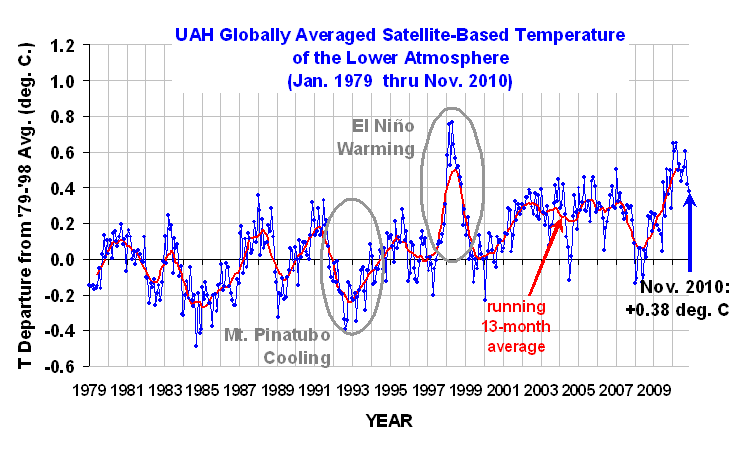
Figure 1: University of Alabama, Huntsville (UAH) temperature chart from January 1979 to November 2010. This chart is shown with no trend lines so the viewer may make his own judgment.
Below is the same temperature chart, showing how 'skeptics', manipulate the data to give the impression of 'Global Cooling'. First, they choose the warmest most recent year they can find. Then, in this case, they exclude 20 years of previous temperature records. Next, they draw a line from the warmest year (The high peak.) to the lowest La Niña they can find. In doing this they falsely give the impression that an ordinary La Niña is actually a cooling trend.
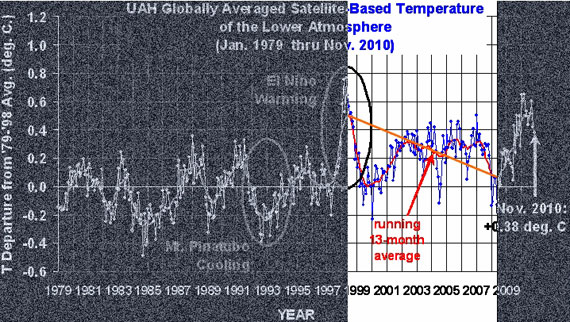
Figure 2: Representation of how 'skeptics' distort the temperature chart. Even though the chart clearly indicates increased warming, 'skeptics' take small portions of out of context to claim the opposite.
What do the past 30 years of temperature data really show? Below is the answer.
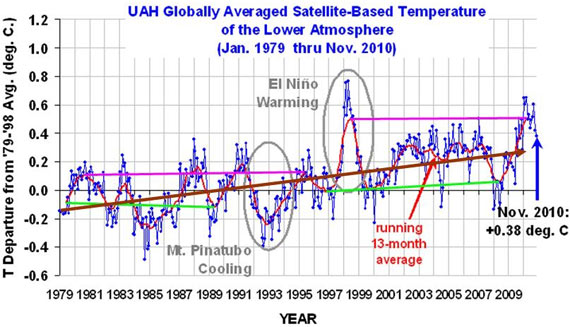
Figure 3: Trend lines showing the sudden jump in temperatures in the 1995 La Niña (Green lines) and the 1998 (Pink lines) El Niño events. Brown line indicates the overall increase in temperatures.
The chart above clearly shows that temperatures have gone up. They are, however, not going up in a steady curve as most people would expect. They are, instead, rising in a staircase fashion. That means they can remain flat for a few years and then suddenly jump up. Then once more they flatten out only jump up again a few years later.
When temperatures for the warm El Niño years (Pink lines) during 1980-1995 are compared to 1998-2010, there is a sudden increase of at least 0.2o Centigrade (0.36o Fahrenheit). Temperatures also jumped up by about 0.15oC (0.27oF) between the cool La Niña years (Green lines) of 1979-1989 and those of 1996-2008 (the eruption of Mount Pinatubo in 1991 lowered the Earth's temperatures in the midst of an El Niño cycle).The overall trend from 1979 through November 2010 (Brown line) shows an unmistakable rise.
While these increases do not sound like much they are more than enough to disrupt weather systems and cause severe damage to crops and human populations.
In spite of these facts, 'skeptics' simply keep changing their dates for 'Global Cooling'.































 Arguments
Arguments























 0
0  0
0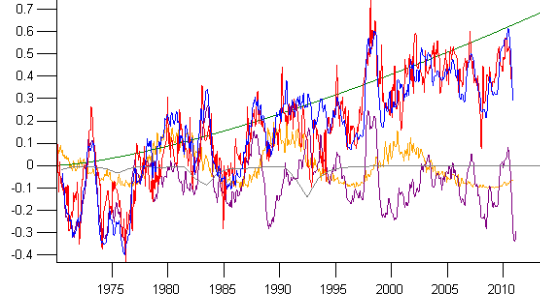 From this you can see that what skeptics call "global warming stopping", ie the flat period since about 2002 is actually compatible with a background warming of about 0.15C during this period that's pretty well all canceled out by the negative ENSO and solar trend.
To stall the warming indefinitely solar output and ENSO would have to keep declining. But they are both pretty well bottomed out now, in fact more likely than not over the next few years both ENSO and the solar cycle will contribute positively, therefore far from negating the longterm warming trend they are going to supplement it. Which is why I think a step change is already underway in global temperature. Although thanks to ENSO noise it will take perhaps a few years to be able to look back on the record and identify a step change has occurred.
From this you can see that what skeptics call "global warming stopping", ie the flat period since about 2002 is actually compatible with a background warming of about 0.15C during this period that's pretty well all canceled out by the negative ENSO and solar trend.
To stall the warming indefinitely solar output and ENSO would have to keep declining. But they are both pretty well bottomed out now, in fact more likely than not over the next few years both ENSO and the solar cycle will contribute positively, therefore far from negating the longterm warming trend they are going to supplement it. Which is why I think a step change is already underway in global temperature. Although thanks to ENSO noise it will take perhaps a few years to be able to look back on the record and identify a step change has occurred.

 Perhaps a room at the "It's Freaking Cold" thread could be permanently procured for him...
The Yooper
Perhaps a room at the "It's Freaking Cold" thread could be permanently procured for him...
The Yooper
 From Jeff Masters' Wunderblog here
From Jeff Masters' Wunderblog here
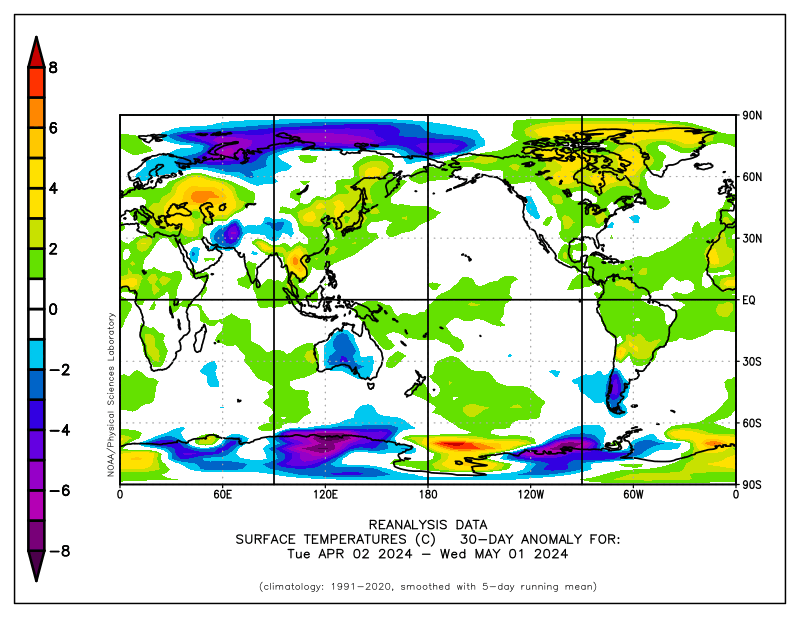 last 30 day anomaly. If you are interested in learning about the data daily anomaly plots (and 7 day, 30 day, 180 day and 365 day plots are available at NOAA weather site, look for temperature anamolies. Your suggestion that the past month has been cold is wrong. Even a simple eyeball of the data shows much more red than purple. The temperature of the past month is much over average.
moderator: my link to the graph is broken. Can you find the problem? thanks.
last 30 day anomaly. If you are interested in learning about the data daily anomaly plots (and 7 day, 30 day, 180 day and 365 day plots are available at NOAA weather site, look for temperature anamolies. Your suggestion that the past month has been cold is wrong. Even a simple eyeball of the data shows much more red than purple. The temperature of the past month is much over average.
moderator: my link to the graph is broken. Can you find the problem? thanks.







Comments